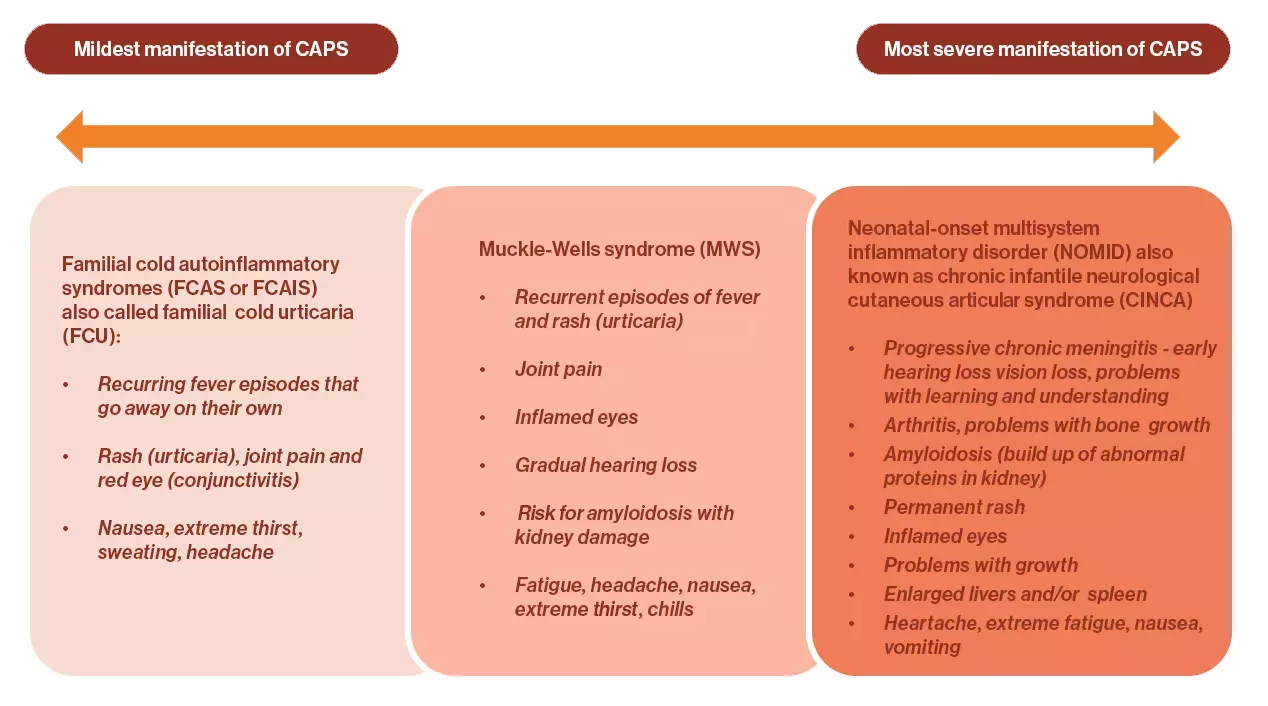What is CAPS?
Cryopyrin-Associated Periodic Syndromes, or CAP syndromes are autoinflammatory diseases that are usually inherited. CAPS actually includes three different conditions with overlapping syndromes of increasing severity:1
These conditions are:
- Familial cold autoinflammatory syndrome (FCAS)
- Muckle-Wells syndrome (MWS)
- Neonatal-onset multisystem inflammatory disorder (NOMID) or chronic infantile neurological cutaneous articular syndrome (CINCA)
References
1. Lachmann HJ, Kone-Paut I, Kuemmerle-Deschner JB, et al. N Engl J Med 2009; 360(23):2416-25.
What are the symptoms of CAPS?
The severity and frequency of symptoms differs for each of the three conditions.

Possible symptoms of CAPS (modified according to 3–5)
Common symptoms of CAPS include hive-like rash, fatigue, headache, fever, joint pain and swelling, and red eyes4 Symptoms may be triggered by cold or changing temperature, stress, and exertion. FCAS is considered the mildest form and is not associated with chronic inflammation. The more severe CAP syndromes have symptoms including hearing loss, with a major symptom of NOMID/CINCA being damage to the brain.4
What causes CAPS?
CAPS is the result of a mutation in the NLRP3 gene (also called NALP3, and CIAS1). This gene carries the code for a protein responsible for the activity of a chemical called interleukin 1 beta (IL-1β), that promotes the inflammatory response. With CAPS, the alteration in this gene leads to a continuous production of IL-1β and a heightened inflammatory response that affects the entire body.4,6 Further information about the CAPS conditions can be found at http://www.autoinflammatory.org/downloads/finalCAPSbrochure_web.pdf
Is CAPS a rare or common disease?
CAP syndromes are extremely rare, affecting about one out of every one million people.2 It is believed that there may be additional cases of CAPS that remain undiagnosed or misdiagnosed. Some patients may present with symptoms of more than one CAPS condition, complicating the diagnosis between FCAS, MWS or NOMID.2
What happens over the course of CAPS?
Most CAPS patients will have displayed symptoms from birth, but FCAS and MWS can start later in childhood or adulthood.5 How CAPS impacts a person’s life varies depending on the severity of the syndrome.5
All people with CAPS will experience episodes of fever, rash, joint pain, and eye inflammation. With FCAS, these can be triggered by exposure to cold temperatures. Hearing loss eventually develops in most MWS patients, but in NOMID/CINCA this is usually seen in the first decade of life. While the long-term outcome in FCAS is generally favourable, the impact for NOMID/CINCA patients can be significant. Untreated, NOMID/CINCA can lead to permanent organ damage and disability, including loss of vision, slowing of growth, loss of mobility and problems with learning and understanding.4,6